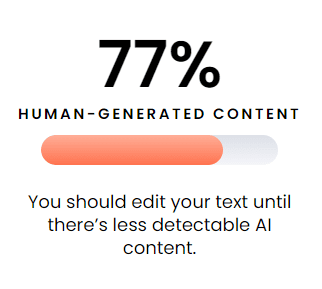ChatGPT is based on the GPT (Generative Pre-trained Transformer) architecture and can generate coherent and grammatically correct responses to a wide range of text-based inputs, such as questions, prompts, or conversation starters. It has been trained on a vast corpus of text data. It can generate responses in multiple languages, making it a versatile tool for various natural language processing tasks.
However, despite its advanced capabilities, it has some inherent limitations. Here are the 10 reasons why one might not want to use ChatGPT for content writing:
1. Limited creativity
Although ChatGPT can generate grammatically correct and semantically meaningful text, its responses might lack the creativity and originality that a human writer can bring to the table.
2. Generic content

As an AI language model, ChatGPT does not have personal experiences or opinions that can add a unique touch to the content. Thus, the content generated by ChatGPT might appear generic or lack a distinctive voice.
3. Impersonal approach
Content written by ChatGPT may not have the same personal touch or emotional impact that a human writer can bring to the table. This might make the content appear unrelatable or impersonal.
4. Insufficient research

While ChatGPT can use vast amounts of data to generate responses, it is still limited by its training data. This means that its responses might lack the depth and breadth of information that a human writer can provide by conducting thorough research.
5. Inaccurate data
Sometimes, ChatGPT’s responses might include inaccuracies or errors, which might not be immediately obvious to the user. These errors could lead to misinformation or misunderstanding, which could negatively impact the credibility of the content.
Related: ChatGPT: A Game-Changer for the Marketing Industry
6. No human touch
While ChatGPT can mimic the language patterns of humans, it lacks the emotional intelligence and nuanced understanding humans bring to writing. This means that content generated by ChatGPT might come across as robotic or lacking a human touch.
7. Limited subjectivity
ChatGPT cannot provide subjective opinions or personal experiences, which can be essential to certain forms of content writing, such as memoirs or personal essays.
8. Inability to provide context
Sometimes, ChatGPT’s responses might lack the necessary context that a human writer can provide to make the content more informative or engaging.
9. Lack of creativity in storytelling
While ChatGPT can create narratives, its responses might lack the creativity and nuance that a human writer can provide when crafting a compelling story.
10. Ethical concerns
While ChatGPT strives to be an ethical AI model, there are still concerns about using AI for content writing. This is especially true in cases where AI-generated content is being passed off as human-written content, which could be misleading or unethical.
While ChatGPT can generate grammatically correct and semantically meaningful text, it has several limitations for content writing. These limitations include the lack of creativity, personal touch, and emotional intelligence that humans can provide and concerns around accuracy, research, and ethics. Therefore, weighing the pros and cons of using ChatGPT for content writing is crucial, and determining whether they fit one’s needs.

